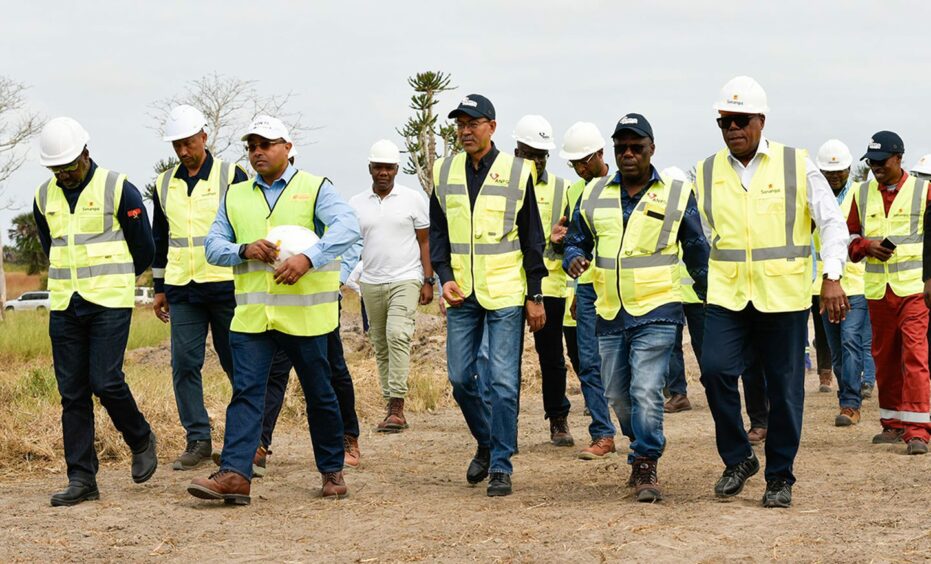
Sonangol is to move into testing at its onshore drilling, according to Corcel, following positive results from the second well.
Corcel announced the progress on December 28. The UK listed company has a 20% working interest in Block KON-11, which is operated by Sonangol.
Sonangol began drilling the Tobias-14 well on November 13. It has now reached its target depth of 781 metres, finding around 80 metres of Binga reservoir section. Corcel said the zones were identical to those encountered at the Tobias-13 well, which was spudded in September.
The Tobias-14 is at the top of an anticlinal structure, the company said, and an offset from the largest historic producer on the field, Tobias-4. This original well produced at 12,580 barrels per day at peak, although only penetrating the first eight metres of reservoir.
Sonangol and Corcel believe the results will allow them to restart production via an early production system (EPS). The well implies “significant hydrocarbon potential remaining”, Corcel said.
Corcel executive chairman Antoine Karam described Tobias-14 as encouraging. These “constitute a significant milestone toward development of an EPS and providing line of sight to near-term revenue generation for Corcel”.
Karam said the results show the formations in the wells are contiguous and should contain movable oil.
“Given the historically wide well spacing of the field, there appears to remain substantial areas both undrained and now potentially re-charged since the original field was shuttered.”
The next step will be to test the well, he said. This will “determine formation pressures and ultimately flowrates, and we look forward to further announcements as Sonangol, the operator, moves to well testing”.
Corcel noted that initial readings supported the company’s theory that the reservoir had returned to original pressure levels. The well also found no presence of water, despite the Tobias-4 having watered out at the end of its life.
The companies plan to test the Tobias-14 and then Tobias-13 wells, it said. Assuming success, they will then move into the next phase, which will cover designing the EPS.
Strategic moves
Petrofina was the original developer of the onshore block, which has been inactive since the late 1990s. The Tobias field included 14 vertical wells.
Corcel has said that modern drilling and completion, potentially with sidetracks and horizontal drilling, will lead to a higher original oil in place figure. Tobias reached peak production of 17,500 bpd, with total oil produced of 29 million barrels.
Further helping, Corcel said the block would qualify for marginal field fiscal terms, providing “advantageous royalty, tax and depreciation regimes”.
KON-11 is close to blocks available under Angola’s current onshore licence round, in particular KON-15. The round closes on December 31. Speaking to Angola’s Expansao in September, Karam said the company was interested in acquiring more blocks onshore in Angola.
Board changes
Corcel has recently announced the appointment of Geraldine Geraldo, Pradeep Kabra and Andrew Fairclough to its board. It also plans to appoint Jennifer Ayers and Deepak Kohli to the board.
This, the company said, represents Corcel’s shift towards oil and gas, and particularly onshore work in Angola.
Chairman Karam said the “revised board will have the deep executive and oil and gas technical and advisory experience required to drive Corcel to its next level of development, building on the work we have already done to reshape the portfolio and commence our operations in Angola”.
Ewen Ainsworth, meanwhile, is now leaving the board.
Geraldo is Corcel’s managing director in Angola and chief commercial officer. She previously worked for Chevron in the US and Angola. Ayers is the chief technical officer.
Pradeep Kabra was the CEO of Kurdistan-focused ShaMaran Petroleum. Fairclough was most recently CFO of Serinus Energy. Kohli is the CEO of Dubai’s Faber Capital, an M&A advisory.
Scott Gilbert, who was involved in the Apex deal, will not join the board now. Instead, he will remain a consultant. Corcel was previously focused on rare earths and mining. It bought a 90% stake in Apex earlier this year, giving it access to three onshore Kwanza blocks.
Recommended for you

